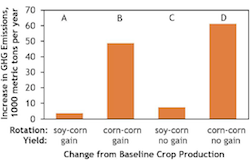A new published study from the University of Michigan and funded by the American Petroleum Institute (API) finds that when using annual basis carbon (ABC) accounting, corn-ethanol is not better than its petroleum counterpart. ABC accounting uses spatially and temporally explicit analysis of the direct greenhouse gas emissions (GHGs) exchanges between the atmosphere and a physical vehicle-fuel system. LCA is the analysis of the environmental impact of a product from cradle to grave, or in the case of liquid transportation fuels, “well to wheel”.
 The study abstract states that using an ABC case study of a corn ethanol biorefinery and the farmland that supplies it shows that using the ethanol it produced instead of gasoline provided no significant reduction in GHG emissions, in contrast to an LCA result that found a 40% GHG reduction for the same facility.
The study abstract states that using an ABC case study of a corn ethanol biorefinery and the farmland that supplies it shows that using the ethanol it produced instead of gasoline provided no significant reduction in GHG emissions, in contrast to an LCA result that found a 40% GHG reduction for the same facility.
In response to the recent study Tom Buis, CEO of Growth Energy, said, “We can add this study to the ever growing pile of flawed research funded by Big Oil, who has a vested interest in protecting its monopoly on our nation’s fuel and ensuring that America stays addicted to oil. The standard life-cycle assessment tool accepted by the scientific community, Argonne National Laboratory’s GREET model, shows that ethanol reduces greenhouse gas (GHG) emissions by 34 percent compared to gasoline. No amount of self-serving science will change the fact that in addition to reducing GHG emissions, ethanol also reduces our nation’s dependence on foreign oil and the price of gasoline for America’s drivers.”

